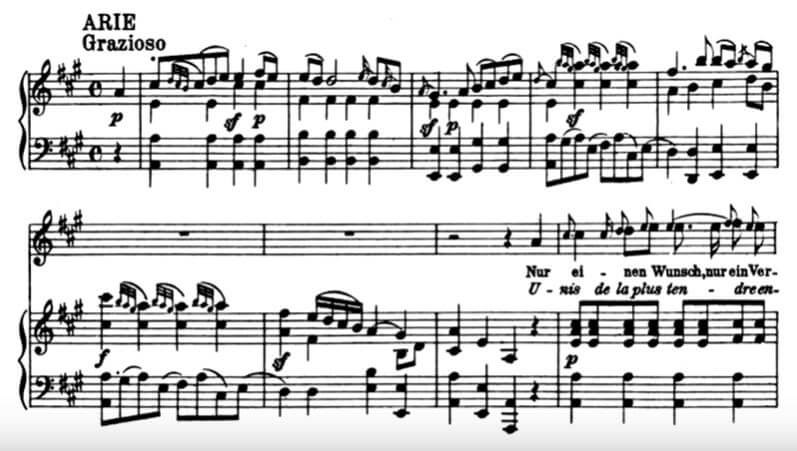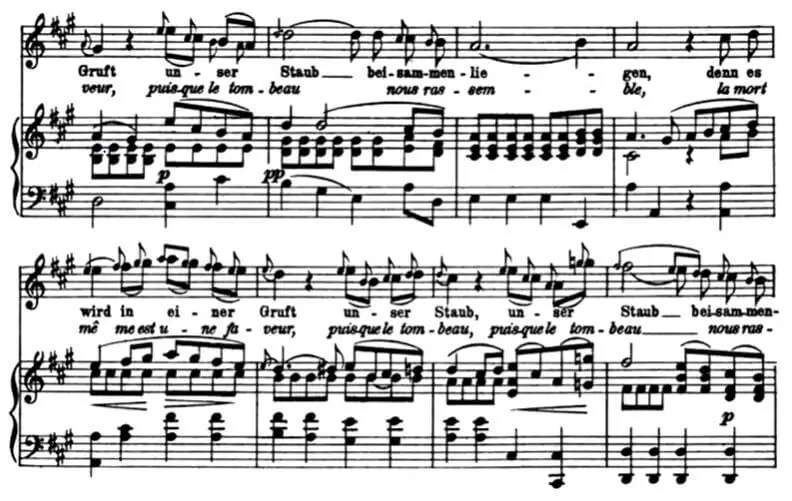The Portrait of Gluck’s aria UNIS DÈS LA PLUS TENDRE ENFANCE
Read Interesting facts and hear great YouTube Videos about the famous Aria “UNIS DÈS LA PLUS TENDRE ENFANCE “.
The aria – synopsis & background
5 years before writing “Iphigenia in Tauris”, Gluck moved 1772 to Paris and enjoyed the protection of Marie Antoinette, the daughter of the Austrian Emperor, who spoke the same language as the German Gluck. The later French queen had received singing lessons from Gluck in her Viennese youth and was (as the 18-year-old wife of Dauphin Ludwig) already his patron at Gluck’s Parisian Iphigenie in Aulis.
The singing culture that Gluck encountered in Paris must have been awful. Marie-Antoinette brought Gluck in, to teach Parisians how to sing. Even the 22-year-old Mozart, who was in Paris in 1778, was not very flattered by the singing in Paris: “Singing! – oimè! – If only no Frenchwoman sang Italian arias. I would still forgive her her French blubbering, but to spoil good music is unbearable … They do not sing, they scream at the top of their lungs.” Gluck was also highly irritated by the French art of singing. To his Parisian Orpheus, he said: “Unbelievable, sir, you always scream when you’re supposed to sing, and if you have to scream just once, you never make it!”
The reform of the opera, which Gluck had begun 17 years earlier with the “Orfeo ed Eurydice”, affected not only the dramatic design but also the singing voices. Gluck largely dispensed with ornamentation and melodic lines became more straightforward. The roles of his opera were not the grotesque and stencilled operas of Italian opera, but noble characters of flesh and blood.
Synopsis: Agamemnon, who led the Greeks against the Trojans, was forced to sacrifice his daughter Iphigenia to the goddess Diana to enable his army to have favourable winds. He resisted, but Iphigenia was willing to sacrifice herself in Aulis. Diana, moved by her sublimity, took Iphigenia and secretly made her a priestess on the island of Tauris. Agamemnon’s wife Clytemnestra slays her husband in revenge for the loss of her daughter. Orest, enraged by the murder of his beloved father, kills his mother. When Orest asked the oracle how he could atone for the matricide, it sent him to Tauris without telling him about his sister. Orest is now on his way to the island, together with his faithful friend Pylades. There the two are arrested by the soldiers of the ruler Thoas and put into a cell. There the two friends are waiting for the death that awaits them. Orest is shocked that he has led his friend to his death. But Pylades does not want to hear about it, he is proud to die with his friend. Nostalgically he remembers the friendship that has lasted since their childhood days.
The aria begins in piano and in an intimate mood. The orchestra opens tenderly with painfully sweet sixths:
The cantilena must be sung in legato. It moves in a narrow tonal range and has no expressive leaps. To maintain the tension of the aria, the singer is forced to give colour and life to each phrase.
The longing to be united in death must be sung nobly and leads to a high G sharp on “réunir”.
The middle part leads back to the tender mood of the beginning:
It leads to a climax, “La mort même est une faveur” (Death itself is a favour), which is repeated in a higher register and has to draw the comforting pain that the way out of death makes the two of them experience.
The elegiac piece ends comfortingly.
All in all, the aria doesn’t offer any great technical difficulties, the more demanding it is to interpret the tragedy of the two with the voice in an appropriate way
Vocal fach “lyric tenor”
The role of Pylades is written for a lyric tenor. The lyric tenor has a soft, melting voice. The voice must be rich and agile in melodic creation. He can reach the high notes with ease and create a beautiful sound. The lyrical tenor must be able to sing both intimate pieces and more exciting pieces convincingly.
The Aria – the text of UNIS DÈS LA PLUS TENDRE ENFANCE
Unis dès la plus tendre enfance
Nous n’avions qu’un même désir:
Ah! mon cour applaudit d’avance
Au coup qui va nous réunir!
Le sort nous fait périr ensemble,
N’en accuse point la rigueur;
La mort même est une faveur,
puisque le tombeau nous rassemble.
United since our tenderest childhood,
we had but one and the same desire.
Ah! My heart applauds in advance
the stroke that will reunite us!
Fate decrees that we shall perish together:
do not reprove its harshness.
Death is itself a favour,
since the grave unites us.
Famous interpretations of UNIS DÈS LA PLUS TENDRE ENFANCE
We hear this aria in three interpretations.
Fritz Wunderlich was able to give this aria the shine it needs. Pylades’ pain and confidence of get a wonderful nobility and intensity. It is sung in German language (from Gluck’s later adaption for Vienna).
Nur einen Wunsch, nur ein Verlangen (1) – Wunderlich
Georges Till’s (1897-1984) voice exerts a very special charm. A little vibrato, a clarity of voice and an exquisite tone let the aria appear in the most beautiful light. Especially his French diction is natural and proves that the language is suitable for singing, even if many singers make some pieces difficult to bear with their unnatural and bad pronunciation.
Unis dès la plus tendre enfance (2) – Thill
The Swede Gedda was considered the best “French” singer in his generation.
Unis dès la plus tendre enfance (3) – Gedda
Peter Lutz, opera-inside, the online opera guide to the aria “UNIS DÈS LA PLUS TENDRE ENFANCE” from the opera Iphigenia in Tauris from Christoph Willibald Gluck








Leave a Reply
Want to join the discussion?Feel free to contribute!